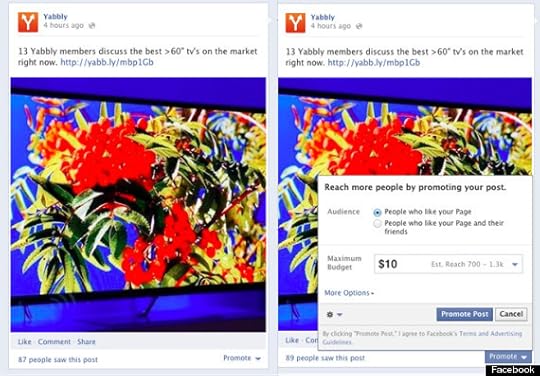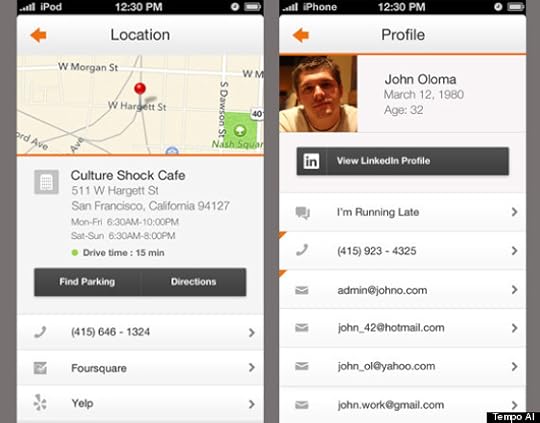Bianca Bosker's Blog, page 18
February 15, 2013
Facebook Now Lets You Pay To Promote Friends' Posts, Whether They Like It Or Not
That seems to Facebook's hope, anyway. Facebook announced users can now pay to promote a friend's status update and ensure it's widely viewed by that person's circle of friends, a move that expands a similar feature unveiled in October. Previously, individuals could only pay to promote their own posts and guarantee they'd be seen by more than 16 percent of their friends (the average reach for a Facebook status update).
The expansion of Facebook's Promoted Posts marks another attempt by the social network to make money off its users' relationships and cut through the clutter in the Facebook news feed. Though Facebook maintains it's "free and always will be," in the year since Facebook announced its plans to go public, the social network has systematically introduced a slew of tools aimed at getting its members to buy things directly from the social network.
In addition to Promoted Posts, there's also Facebook Gifts, a way to purchase presents through the site; the Facebook Card, a "new type of gift card"; and Paid Messages, which charges users to be sure messages bypass the recipient's junk-mail folder.
The social network is increasingly keen to turn its members into customers, and has been working to collect its users' credit card information alongside Instagram photos and wedding albums. So far, however, revenue from features like Facebook Gifts has been negligible, according to Facebook's most recent earnings report.
Sponsoring a friend's post guarantees it will appear in a higher percentage of his or her friends' News Feeds, though Facebook notes the tool "respects the privacy of the original poster -- i.e. it will promote to everyone who originally saw it."
However, users needn't receive their friend's permission before pushing his or her post to more people, and individuals will be notified only after the promotion has been purchased. While it's nice to think that only our accomplishments will get our friends' financial support, that might be a bit naive.
The Promoted Posts feature is also available only to people with fewer than 5,000 total friends and subscribers. Here's what it looks like:

In a press release, Facebook suggested that people had already used the feature to publicize charity fundraising efforts, major personal announcements, items for sale or accomplishments.
"If your friend is running a marathon for charity and has posted that information publicly, you can help that friend by promoting their post to all of your friends," wrote Facebook in the release. "Or if your friend is renting their apartment out and she tells her friends on Facebook, you can share the post with the people you and your friend have in common so that it shows up higher in news feed and more people notice it." Or as HuffPostTech reader Henggao Cai noted on Facebook, "If your friend needs a kidney you can promote his status about a kidney donor to speed up the process of finding a donor."
But Facebook already has a completely free way to ensure more people see a post: users can simply repost their friends' links and share the information to their personal friend group.
Say a friend's band has a gig on Saturday. Is it really preferable to pay, say, $7 to be sure a higher percentage of your mutual friends see information about the concert? Or will you reach more people just by sharing the link to your own friend group, which may have little overlap?
It's also worth considering the social implications of each option. Promoting a friend's post shows someone is willing to put her money where her mouth is. But it remains to be seen whether Promoted Posts could in turn diminish the value of congratulating a friend the classic way, without paying for eyeballs. And which is more thoughtful: spending a few dollars to push out a post, or taking the time to publicly congratulate a friend in your own words?
February 13, 2013
Google Now Update Aims To Make Google's Assistant Part Of Your Regular Routine
The assistant, which seeks to anticipate what information people will need before they've even asked for it, is giving users the option to put the app front and center on their phones for faster -- and, Google no doubt hopes, more regular -- access.
Currently, people have to unlock their phones and swipe their phone's home screen to view the assistant's customized list of "cards," which present personalized updates on sports scores, traffic, nearby tourist attractions, recommended restaurants and reminders, among other types of information.
Google Now's most recent update will allow users to check in with the assistant directly from their lockscreen or homescreen and to save their most frequently-accessed "cards" for easy reference.
"For me personally, this has increased my usage of my own product," said Google Now co-creator Baris Gultekin.

"The new Google Now widget brings all your important Now cards to your home or lock screen, so you don't even have to open the app," Google wrote in a blog post introducing the new look.
Google Now already sends alerts to users when it deems there's urgent information they should see, though Gultekin notes Google tries to use the alert system sparingly. For example, Google Now can tap into a person's calendar, Gmail correspondence and location information, along with Google's own mapping data, to warn someone there's bad traffic on her route to the office that will make her late for a key meeting.
"With Google Now, our goal is to have the computers do the hard work so you don't hve to deal with all the details and you can focus on the things that matter to you in life," said Gultekin. "This is search not with a keyboard, but with your context. We're providing information based on your situation, so you don't even have to search."
Google Now is also being integrated with Rotten Tomatoes in order to put movie reviews alongside trailers and showtime information, Google announced Wednesday. In addition, the assistant will sync with real estate site Zillow so it can alert prospective homebuyers to houses in their area that are on the market. While visiting an open house, Google Now can use a person's location -- paired with Zillow's database -- to push them information about the home they're visiting.

A screenshot of Google Now's Zillow integration.
Tempo Smart Calendar App Boasts Siri Pedigree And A Calendar That Thinks For Itself
As Singh sees it, that Android or iPhone in your pocket is more accurately a “semi-dumb” phone with a suite of apps -- for emailing, note-taking, tracking contacts and scheduling events -- that are at best digitized versions of the paper originals.
But he has a solution: build a calendar with a brain, then teach it to think for itself.
Singh, co-founder and CEO of Tempo AI, is adding to a growing number of artificially intelligent assistants with the launch of a new app, the Tempo Smart Calendar, that draws on research from the same project that provided the building blocks for Apple’s Siri.
While existing calendars know as much as users tell them and little more, Tempo Smart Calendar leverages artificial intelligence and personal data to not only track a person’s commitments, but understand the intent of her scheduled plans, predict what she needs to know ahead of each event and call up all the information she’ll require for a meeting. That could include everything from relevant documents and important emails, to a map of the destination and the cellphone number of the person someone is going to meet.
“When we were thinking about what the next generation of assistants would be, we said, ‘Let’s take Siri and add context to Siri,’” explained Singh.
But he was also conscious of creating an assistant that wouldn't overwhelm users with a barrage of suggestions and extraneous tips (Think Microsoft's over-eager assistant Clippy). “The calendar is a way to add an assistant-like functionality to the user experience in a way that doesn’t feel noisy,” said Singh.
Like a human assistant, the Tempo Smart Calendar app, released Wednesday for iOS devices, is meant to learn a person’s routine and then anticipate what the user will look for before the user specifies it -- even with very little information to go by.
I tested the app’s mettle by creating a vaguely-named calendar entry identified only as “Interview Korean radio.” When I opened the event in the Tempo Smart Calendar app, it pulled up four email threads it deemed relevant -- including the key email in which in which I’d set up the call -- along with two documents from my email inbox it thought would be helpful. To its credit, they were precisely the two documents I would have wanted.

In another test, I created the appointment “Lunch Alissa Pain Quotidian.” The app not only summoned up emails, but offered up a map of the restaurant’s location (together with its phone number, website, Foursquare rating, Yelp review and nearby parking lots). And, by searching through the content of those emails, Tempo Smart Calendar identified the contact information for the people it reasoned had been invited to the event (the correct Alissa was among the three it suggested). The app also offered a way I could, in just a click or two, message Alissa to tell her I’d be running a few minutes late, without digging around for her cellphone number or email address on my own.

Not all entries get the same special treatment, however. A reminder to “go to the gym” won’t look all that different on Tempo’s app, and Singh notes that the company is trying to determine what information would be most helpful for those types of events. Would it be a map? A motivational quote? A picture?
The startup has gathered data on the most common types of calendar entries -- team meetings, working lunches, business dinners and other corporate America pastimes -- and has prioritized enhancing those events. If you have a conference call on your calendar, the Tempo Smart Calendar app will auto-dial into the call. In addition, a calendar entry with a flight number will automatically call up flight status information, and a birthday reminder gives the option to post a birthday message to a friend's Facebook wall.
Like Siri, Tempo was spun out from SRI International, a non-profit research lab that oversees technology research funded by companies, government organizations and institutions. And like Siri, Tempo has leveraged technology from the Defense Department-funded CALO project, a five–year effort that united hundreds of artificial intelligence leaders under the mission to build a “Cognitive Assistant that Learns and Organizes.” The Smart Calendar app has integrated several of CALO’s most noteworthy features, including Emma (a "personalized calendar management assistant") and PrepPak (AI technology that could summon up important messages and documents).
“There’s a wave of assistants coming,” Singh said. “It’s a new layer that’s coming to all applications.”
February 11, 2013
Philip Parker's Trick For Authoring Over 1 Million Books: Don't Write
His name is on their covers, but he hasn’t actually written them all -- that chore falls to a machine.
Parker has developed a small arsenal of algorithms capable of automatically generating textbooks, crossword puzzles, poems and books on topics ranging from bookbinding to cataracts.
The software isn’t intended to replace Shakespeare or Updike (though a fiction-writing algorithm is in development). Rather, Parker hopes to generate written materials on niche topics and in rare languages that would be economically unfeasible for traditional publishers to produce. His titles on Amazon.com, more than 100,000 in all, range from economic reports ("The 2007-2012 World Outlook for Luggage and Utility Racks," priced at $795) to Unami-to-English crossword puzzles to medical guides ("The Official Patient's Sourcebook on Vocal Cord Paralysis.")
Parker started by generating market reports sold to banks, consulting firms and government trade agencies interested in the sales outlook for, say, rubber or corrugated cardboard. Now, he hopes to use the algorithms to help with language learning and education in developing countries. Thanks to Parker’s automated radio broadcasts, people in parts of Malawi are hearing weather forecasts in the local language for the first time -- and are already changing their farming patterns as a result.
For our “Life As” series, we spoke with Parker about authoring with an algorithm, why dissertations could be automated and how watching television could change in drastic ways.
Will I be obsolete soon? What are the implications of your software for writers?
There are very few implications for writers because we’re covering areas that writers don’t or can’t cover. When you’re looking at small languages, the population of speakers is so small that there might not be people with the expertise in science or agronomy to write optimal planting strategies for maize in the local language. Every title we create is educational. All of these projects seem very diverse, but really they’re all in same vein: we’re using automation to reach areas that wouldn’t have been served otherwise. And it gives people the opportunity to see or experience content they wouldn’t have been able to otherwise.
But surely we can outsource some existing tasks to your algorithmic authors? Already there are algorithms writing articles for Forbes, for example.
There are many forms of writing that are common, but also very formulaic, such as annual reports or economic studies. In those areas, people would probably be relieved not to have to write those kinds of things because they are mundane and drudgery.
If you want to wax philosophical, you could see these algorithms as an enabling tool. There are a lot of people who want to be writers who stumble at a blank page. You could imagine an algorithm that could give writers a first draft or a starter kit, so it could enable people to be more prolific in their writing.
How might your technology change how -- or what -- we write?
One of the areas I’m working on is, can we create a doctoral-level thesis that’s fully automated -- to save the pain of four years of a Ph.D. program -- and still come up with an original conclusion? If we could do it in an automated way, we’d increase the speed of discovery. As time goes on, someone might be able to say, “I’d really like to do a doctoral thesis on X and Y with a Z perspective,” and with a few clicks, it will have be authored.
What changes do you foresee in how we consume content?
People will be seeing content they wouldn’t otherwise have seen in their language. But this technology is nowhere near maturity – it’s like the automobile industry in the late 1800s right now. One hundred years from now, things I can’t even imagine will be available. When you watch television, for example, there will be a channel specifically for you generated on the fly using your particular profile. It’ll be rendered in real time before you even watch it, so you may be the first person to ever see that program, but it will be what you most want to see.
We’re far from that. But is it technically feasible? Probably.
How does your software actually write the books, poems and puzzles you produce?
There’s no single piece of software, per se. Each genre we do has its own very customized algorithm that’s been created. For international trade reports, we use econometrics. To write poetry, we use graph theory -- we have a semantic web of knowledge, which took us three or four years to create, and we use a trained database to mimic the human mind in terms of word usage.
What can human authors do that these algorithmic authors can’t?
The toughest thing will be the creation of genres themselves -- A computer would have a hard time inventing cubism, for example. Formula creation is magnitudes harder for computer algorithms than actually executing within a formula. But once the genre is created and the formula is known, then the computer can do the repetitive task of executing within the genre.
This interview has been edited and condensed for clarity.
February 9, 2013
The Di-Vine Life Of Nemo: Watching The World Learn To Socialize in 6 Seconds
Twitter's video-sharing app Vine got to skip all that.
Thanks to Twitter's enormous reach, instead of building an audience from the ground up, Vine, which lets users share and upload six-second videos, got to pitch its service directly from the top to an audience of 500 million registered users. Now pair that with major weather event to fuel photo and video sharing, and you've got a killer combination most app creators could only dream of.
There's nothing like intense fog/snow/sunsets/rain to get people's iPhone cameras clicking -- Instagram saw 10 photos per second uploaded during Hurricane Sandy -- and Vine got an added boost over the weekend as "Nemo" descended on the Northeast. Twitter, which declined to share data regarding Vine usage on Friday, got to observe people playing with its newest toy. And the world in turn got to watch a critical mass of people learning to use a social network all at once.
Sites like RebelMouse and ViningNemo.com aggregated incoming "vines" capturing the fallout from Nemo, and the results ranged from mini-movies to the highly mundane. Beautiful, sepia-tinted photos they certainly were not, and the stop-and-start nature of the vines made many some seem like less-ghoulish versions of Clockwork Orange's Ludovico technique.
Some social start-ups, when they're just starting out, will seed their service with a specific group of users they hope will instill certain norms and practices in the community as it grows. Through their model participation, early adopters will teach other newcomers how to behave. Facebook, for example, benefited from having thousands of partying, flirtatious college students show that it as perfectly acceptable to share photos, send messages, poke people and post on friends' walls. And Instagram's loyal following of photographers and design buffs early on no doubt boosted its reputation as a repository for aesthetically pleasing and beautiful images.
But Vine has opened to everyone with an iPhone, all at once, and the result is some social soul searching and experimentation by a large group of people who aren't too sure what they're supposed to do with the video app, besides use it.
Twitter for its part seemed to consciously avoid giving people a clear guide for how to use the service. Twitter's blog post introducing its redesigned iPad app clocked in at 249 words. Its blog post introducing an entirely new way of sharing video totaled just 110.
"Rather than tell you more about the app, we thought we'd just show you some of our favorite videos," Twitter wrote in a (very brief) blog post introducing Vine. What followed were three clips: one of kids at a park; another that cut between three views of a recording studio; and an animated flipbook. They couldn't have been more different.
So what did Nemo tell us about how people use Vine? Judging from the uploads during and following the storm, Vine could very well be the Instagram for feet:
Just #walking in #nyc during #nemo vine.co/v/bn9TADAV6Mv
— Elena (@eehood) February 8, 2013
Snow!!! A little late to the #nemo party vine.co/v/bv7v2DLKhgP
— Project Mailbox Inc. (@projectmailbox) February 9, 2013
#nemo aftermath vine.co/v/bv7iLPP3P9U
— Lev Piatigorsky (@levbian) February 9, 2013
The looping photo album -- stop-and-start cuts between more-or-less static images -- is a favorite for vines, along with the slow pan:
Central Park after Nemo #nyc #centralpark #bethesdafountain #bethesdaterrace #snow #blizzard #nemo vine.co/v/bv76YeIFXtE
— Amanda Gordon (@amandafgordon) February 9, 2013
Central Park after Nemo #nyc #centralpark #bethesdafountain #bethesdaterrace #snow #blizzard #nemo vine.co/v/bv76YeIFXtE
— Amanda Gordon (@amandafgordon) February 9, 2013
#nemo #victory vine.co/v/bv76ldF3qlM
— Dan Farese (@dfarese) February 9, 2013
ohhhh, yes I did. ;) #snowman #windowsill #bridgeport #nemo #ctweather #ct #blizzard vine.co/v/bnYvAzpaMtP
— Kelly BigelowBecerra (@ArtStarKelly) February 8, 2013
Vining #Nemo, the walk to Central Park. #NYC vine.co/v/bv7KJTd50Lw
— Samantha Murphy (@MurphySamanthaJ) February 9, 2013
There seems to be some confusion about when to take a video, and when to upload a photo:
#Nemo still raging out there--and people are still walking outside??? More power to them, I guess vine.co/v/bnlAHil3ud1
— Kenji Fujishima (@kenjfuj) February 9, 2013
And, in typical internet fashion, dogs and kids playing around in the snow pretty much steal the show:
RT @rbeccazhou: Chino in his natural element --- snow doggy! buff.ly/YgJrvH
— NemoVines (@NemoVines) February 9, 2013
My pup playing in the snow



